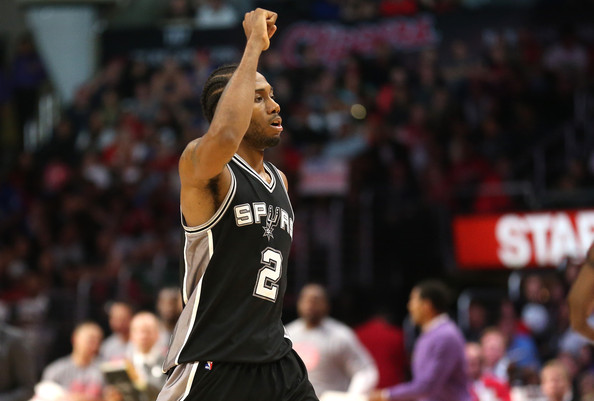Before Saturday night’s blowout of the Brooklyn Nets, the San Antonio Spurs were 18-5. While this is a stellar record, it has not prevented unrest among Spurs fans. Over the course of November, the Spurs failed to put away games until the final moments and routinely allowed other teams to crawl back into contests. This trend trickled into December when the Spurs beat the Washington Wizards and the Milwaukee Bucks by a combined 3 points. It culminated in their first road loss of the season to the Chicago Bulls, where they trailed by as many as 18 in the second half before pulling within 5 by the final buzzer. There has seemingly just been something off about the Spurs to start the 2016-17 season.
The Spurs are currently ranked 14th in opponent effective field goal percentage at 49.9% and, despite having the second best record in the league, are ranked 6th in margin of victory at 5.63 points per game. These numbers don’t bode well for a team vying for their sixth NBA title. For the Spurs organization, however, end goal isn’t to have pretty wins or shiny stats for fans to strut out at office debates. While these numbers do speak to certain weaknesses the Spurs may have, and are certainly not trivial, they also aren’t an albatross in December.
Last season, the Spurs came in as a pre-built great basketball team. This season the journey is potentially more interesting. This season is less about the Spurs showing sheer dominance from opening tip of the opener to the final buzzer of the closing game, it’s about the Spurs becoming great and finding the answers to questions that could have series-altering significance in the postseason. It can be easy to forget, however, that many of the same sentiments were being felt around this team three years ago. While hindsight can cloud what the perception was of the 2013-2014 season while it was occurring, the circumstances may help paint a picture of the feeling of those who follow the team. By the end of December, the Spurs had a record of 25-7 and were looking strong, but many had doubts on this team’s viability in the playoffs. While the Spurs had won many of the games they were ‘supposed to’, they had yet to have a ‘signature win.’ By this point they had lost twice to the Thunder, twice to the Rockets, and once to each of the Portland Trailblazers, the Indiana Pacers, and the Los Angeles Clippers. Each of these teams were considered playoff threats, and worry was being generated over the Spurs’ ability to beat other contenders. By the end of the season, the Spurs were 0-4 when playing the Thunder. Many questioned the Spurs’ ability to match the athleticism of the Thunder and the Miami Heat during a full playoff series, despite the team’s strong record. The Spurs were ultimately able to answer athleticism with execution. The question that had hounded them throughout the season was silenced as the team made precise passes, well-timed cuts, and the right screens at the right times.
The questions that the Spurs are facing this season are different. At what point is relying on Kawhi Leonard offensively going to produce diminishing returns? The Spurs have gone to him late in games often this season to bail them out of tight situations and win games, but is there a point where going to Leonard so often offensively hurts his ability to perform on the defensive end? Of key rotational pieces, only Tony Parker in 2008-2009 has had a usage rate over 30% during the Popovich era. Leonard is on track to have the second such season, meaning that managing a key player who impacts such a large portion of offensive and defensive possessions is relatively unknown for the Spurs over the past decade. Another question the Spurs face is how to find a way to have Parker, LaMarcus Aldridge, and Pau Gasol work as a unit defensively, especially in defending pick-and-rolls. This is currently one of the starting units greatest weaknesses and will continue to be until a new scheme or lineup is found that can effectively mitigate such weaknesses.
But finding answers to questions like these is where the Spurs thrive. They have managed to stay relevant over two decades in a quickly evolving league. They continually find ways to use the personnel they have to counter current league trends and create their own. Sometimes they are successful in finding answers to the difficult questions that they face (such as in the 2014 playoffs against the Thunder), but other times they aren’t able to find a sufficient solution to the problems presented (such as in the 2016 playoffs against the Thunder.) It’s not the success in finding such solutions that’s ultimately important, though. What is more important is that the Spurs are constantly tackling the issues in front of them despite how strong their record may be. They don’t rest in their victories or wallow in their defeats. They are faced with a fresh set of questions this year, giving them an opportunity to show one of their greatest strengths as a franchise, the ability to adapt.
As the Spurs show year after year, sometimes the fun isn’t in having the answers, it’s in finding them.
Statistics were gathered prior to the Spurs’ win over the Boston Celtics
Wednesday. All statistics obtained via basketball-reference.com
Add The Sports Daily to your Google News Feed!
